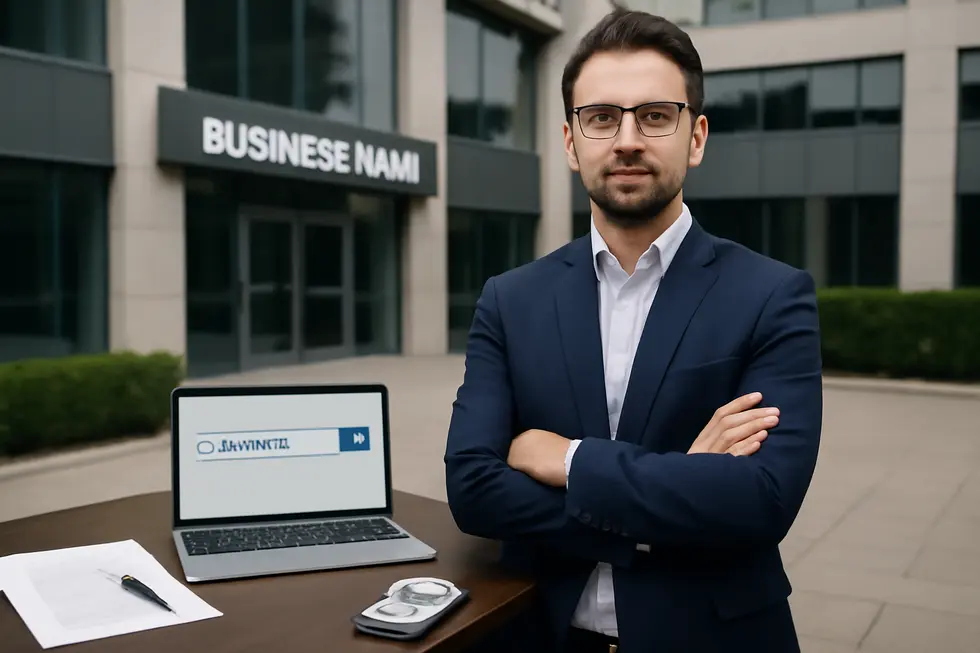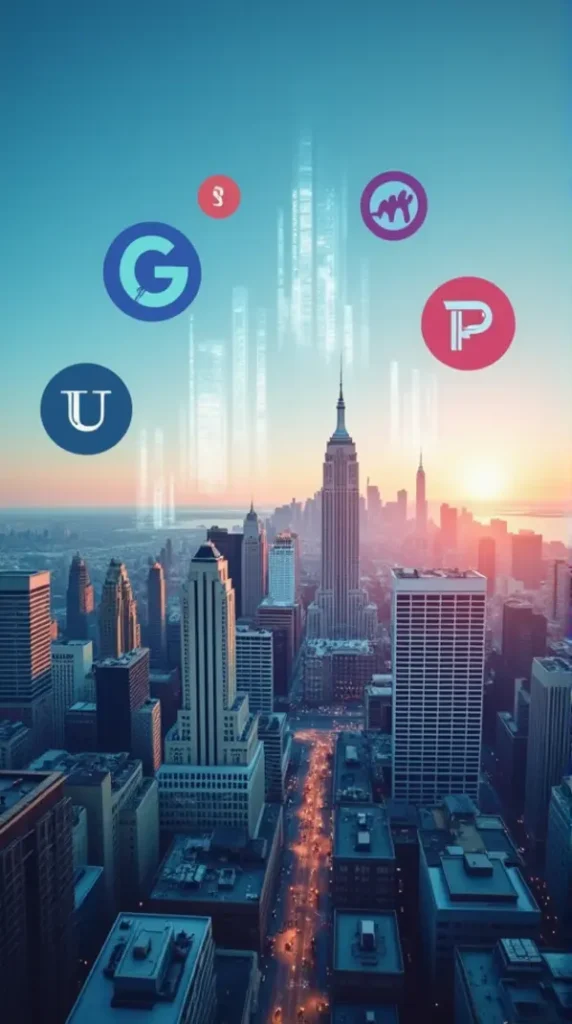Introducción
Choosing the perfect name for your LLC is a fundamental step in defining your business identity. Yet, many entrepreneurs wonder if they can use the same LLC name as another business. This question is more complex than it seems, touching upon state regulations, legal protections, and practical considerations. Understanding how state laws govern LLC name uniqueness, how trademark rights differ from LLC registration, and what actions you can take to protect your business name will empower you to make informed decisions. The chapters ahead will guide you through these critical aspects, helping you navigate the naming process with clarity and confidence.
Índice
Chapter 1: State-Level Restrictions on ‘Can I Have the Same LLC Name as Someone Else’
- Ensuring Distinctiveness: How State Laws Enforce LLC Name Uniqueness and Naming Rules
- Navigating Professional and Reserved Business Naming Rules Within State LLC Name Restrictions
- Navigating State LLC Name Rules and Federal Trademark Protections: A Unified Perspective
Chapter 2: Understanding Trademark vs LLC Name Rights in ‘Can I Have the Same LLC Name as Someone Else’
- State LLC Name Registration vs Federal Trademark Protections: Navigating Your Business Identity Rights
- Why Trademark Protection Matters: Differentiating Commercial Rights from LLC Name Registration
- Navigating the Legal and Commercial Boundaries Between LLC Naming and Trademark Protection
Chapter 3: Practical Steps and Considerations in ‘Can I Have the Same LLC Name as Someone Else’
- Navigating State-Level LLC Name Registration: Ensuring Uniqueness and Compliance
- Beyond Registration: Securing Exclusive Rights Through Trademark Protection for Your LLC Name
- Navigating Assumed Names (DBAs): A Strategic Alternative When Your LLC Name Is Taken
Chapter 1: State-Level Restrictions on ‘Can I Have the Same LLC Name as Someone Else’

1. Ensuring Distinctiveness: How State Laws Enforce LLC Name Uniqueness and Naming Rules
State regulations play a critical role in maintaining the uniqueness of LLC names within their jurisdiction to prevent confusion and protect consumers. Across most states, including New Mexico, New Jersey, Hawaii, and Iowa, the law prohibits registering an LLC name that is identical or deceptively similar to an existing business name. This uniqueness mandate extends beyond LLCs to all registered entities, meaning a new LLC cannot adopt a name already used by a corporation, partnership, or other formed business within the same state, unless the original entity has been dissolved or its name rights relinquished.
To comply, LLC names must incorporate clear designators such as “LLC,” “Limited Liability Company,” or “L.L.C.” This convention clarifies the company’s legal structure and differentiates it from other business types. Beyond suffix requirements, states often restrict the use of certain reserved or prohibited terms—like “bank” or “government”—to prevent misleading the public about the nature or authority of the business.
States also consider the potential for consumer confusion when determining name availability. For example, Iowa’s naming rules reject names even if they are not identical but are confusingly similar to existing ones. This rigorous approach safeguards the legal clarity and marketplace distinction of each registered business.
If a business seeks to operate under a name different from its legal LLC name, the use of a trade name or “doing business as” (DBA) may be allowed, but such names are subject to additional state-level restrictions and registration requirements.
Importantly, name changes remain possible through formal amendments filed with the Secretary of State, ensuring businesses may adapt their branding while complying with legal standards. Consulting the specific Secretary of State’s official business name database before registration is essential to avoid rejection based on similarity or duplication.
For example, New Mexico’s detailed search tools aid prospective LLC owners in verifying name availability and ensuring compliance with state rules New Mexico LLC Naming Rules.
Moreover, exploring the distinctions between state LLC name registration and broader protections like trademark registration is vital for business identity security—details addressed further in related discussions on how trademarks prevent others from using your business name.
2. Navigating Professional and Reserved Business Naming Rules Within State LLC Name Restrictions
When considering whether you can have the same LLC name as someone else within a state, understanding professional and reserved naming rules is essential. States uniformly require LLC names to be unique and distinguishable from all active registered entities, irrespective of business type. This means you cannot register an LLC name identical or confusingly similar to any other active business, including corporations and other LLCs. However, if the existing business is dissolved or revoked, the name may become available for use.
Professional LLCs introduce additional naming complexities. These entities, often formed by licensed professionals like doctors or lawyers, must adhere not only to the general state naming conventions but also to profession-specific regulations established by licensing boards. For instance, in Nebraska, professional LLC names must include required designators such as “LLC,” “Ltd.,” or spelled-out versions of limited liability company, while also conforming to the licensing authority’s guidelines. This dual-layer compliance ensures clarity of both business form and professional accountability.
Most states mandate that an LLC’s name contain a suffix clearly indicating its limited liability status. Such suffixes might be “Limited Liability Company,” “LLC,” “L.L.C.,” or “Ltd.” This requirement helps consumers and regulators identify the entity type easily and distinguishes LLCs from other business structures.
To secure a preferred name before incorporation, many states offer a name reservation process. Filing a reservation application and fee can hold the desired name for a limited period, usually between 30 and 120 days. While this temporarily blocks others from registering the name, it does not guarantee name approval at formation—final compliance with all naming rules is still necessary.
Importantly, state LLC name registration is distinct from trademark protection. While the state ensures name uniqueness within its jurisdiction, it does not grant exclusive rights nationwide. To protect a business name comprehensively, owners must seek federal trademark registration through the USPTO. This federal registration safeguards branding and prevents others from using identical or confusingly similar marks across states.
For more detailed information about protecting your business identity beyond LLC registration, reviewing federal trademark protections can provide valuable insight.
3. Navigating State LLC Name Rules and Federal Trademark Protections: A Unified Perspective
When forming an LLC, understanding the interplay between state-level name registration and federal trademark protections is crucial. Each state mandates that LLC names be unique within its jurisdiction to avoid confusion and protect consumers. This uniqueness requirement means you generally cannot register an LLC name identical or confusingly similar to an existing business entity in the same state. For example, states like Hawaii and Iowa enforce these rules rigorously, rejecting names that are either exactly the same or deceptively similar to others already on record. Typically, LLC names must contain clear entity designators such as “LLC” or “Limited Liability Company” to distinguish them from other business structures, a consistent requirement across states. Despite these state mandates, LLC name registration only grants protection within that particular state. Without further action, the same or similar LLC name can be registered by separate businesses in other states, leaving room for overlap across state lines.
To address this limitation, federal trademark law steps in. A federally registered trademark provides nationwide protection, preventing other businesses from using a name if it causes consumer confusion—even if their LLC registrations differ or exist in separate states. This means that even if a business name is available at the state level, using it could infringe upon a federally registered trademark elsewhere, posing legal risks. Moreover, businesses often register assumed names or DBAs, which must comply with state regulations and similarly avoid conflicts with existing registered names.
Balancing these factors requires thorough research utilizing state business entity databases alongside the federal trademark database (USPTO) before finalizing an LLC name. This dual approach safeguards not only against state-level registration issues but also potential trademark infringements, ensuring stronger brand protection and business identity clarity. For entrepreneurs seeking to expand or protect their brand beyond state borders, pursuing federal trademark registration is a vital step beyond the LLC naming conventions.
For further guidance on protecting your business name beyond state filings, exploring information on marcas legalmente protegidas is valuable. Detailed name availability checks can be performed through resources like LLC University’s guide on naming and LLC formation.
Chapter 2: Understanding Trademark vs LLC Name Rights in ‘Can I Have the Same LLC Name as Someone Else’

1. State LLC Name Registration vs Federal Trademark Protections: Navigating Your Business Identity Rights
When forming an LLC, a key legal consideration is whether you can use the same name as another business. State laws generally require each LLC name to be unique within that state to avoid public confusion. This means your desired LLC name cannot be identical or deceptively similar to other registered LLCs in your state. States such as Hawaii and Iowa strictly enforce these naming rules through their business registries. However, this exclusivity is limited strictly to the state level. Because LLC registration operates primarily as a tool for business identification and tax administration, it does not grant you nationwide or broader intellectual property rights to the name.
In contrast, trademarks provide much stronger and wider-ranging protection. Registered federally with the United States Patent and Trademark Office (USPTO), trademarks give owners exclusive rights to use a specific name, logo, or slogan nationwide within their registered industry or class. This prevents others from using confusingly similar marks in the same commercial space across all states. Simply put, a federally registered trademark offers legal tools to enforce rights both in and beyond your home state.
Thus, while multiple LLCs with the same name may exist in different states, only one business can hold a trademark over that name nationally in the same industry. If you want to protect your brand beyond your LLC formation, seeking trademark registration is essential. You can still form an LLC with your name in your state if it is available, but the absence of trademark protection means others in different states or industries could use the same or similar names without infringing.
If your chosen LLC name is taken in your state, consider modifying it with descriptive or geographic terms, verify trademark status to avoid conflicts, or consult legal counsel to explore name rights. Combining LLC registration with trademark protection strategically secures both your state business identity and your brand’s exclusive rights nationally.
For deeper insights on protecting your business name beyond LLC registration, consult resources on registrar el nombre de su empresa.
2. Why Trademark Protection Matters: Differentiating Commercial Rights from LLC Name Registration
When considering whether you can have the same LLC name as someone else, it’s essential to understand that LLC names and trademarks represent two distinct legal concepts focused on different protections. An LLC name serves as the official business identifier filed with a state’s government. Its purpose is mainly administrative—for tax filings and legal recognition within that state. Importantly, registering an LLC name does not grant exclusive rights to use that name commercially. States typically prevent exact duplication or confusing similarity of LLC names within their borders, but this does not preclude other entities in the same or different states from registering a similar or even identical LLC name if no trademark exists.
By contrast, a trademark protects a business’s brand identity—its name, logo, or slogan—as it is used in commerce to distinguish goods or services. Trademark rights arise through actual commercial use (common law) or by registering with the United States Patent and Trademark Office (USPTO). Federal registration provides nationwide exclusivity and legal tools to prevent others from using confusingly similar marks that could mislead consumers. Thus, trademark protection extends beyond the boundaries of state business registries and specifically safeguards the commercial presence of a business.
This distinction means two or more LLCs may share the same name under state law, yet trademark law determines who can exclusively use that name in trade. Without a trademark, your LLC name offers only limited protection. Trademark registration uniquely allows you to enforce your exclusive rights against unauthorized use across a broader geographic area and in court.
When forming an LLC, it is wise to first check name availability using your state’s business entity search and then consider registering a trademark to secure exclusive commercial rights. Understanding this difference clarifies why having the same LLC name as someone else is possible, yet protecting your brand requires trademark safeguards.
For more insight into how trademarks protect your brand beyond LLC registration, see this detailed resource on trademark versus LLC name rights.
3. Navigating the Legal and Commercial Boundaries Between LLC Naming and Trademark Protection
When forming an LLC, choosing a name involves more than simply checking state availability; it carries significant legal and commercial consequences. An LLC name is a state-level designation used primarily for administrative recognition and tax identification. States require LLC names to be unique within their jurisdiction to avoid confusion, as is the case in states like Hawaii and Iowa. This uniqueness ensures that businesses do not register identical or deceptively similar names in the same state. However, such registration does not provide broader protection beyond this administrative scope.
Unlike LLC registration, trademark rights offer commercial exclusivity and protect brand identity at a federal level or through common law rights based on actual use in commerce. A trademark safeguards a business’s name, logo, or slogan associated with specific products or services, preventing others from using confusingly similar marks in the marketplace. This protection is crucial for building brand recognition and customer loyalty beyond state borders.
It is important to understand that owning an LLC name does not automatically grant trademark rights. Conversely, having a federally registered trademark does not ensure the ability to register the same LLC name in a particular state if that name is already taken. This dynamic means businesses often secure both an LLC registration for legal formation and a trademark for commercial brand protection to create a comprehensive shield around their identity.
To mitigate risks of disputes and infringement, thorough searches of both state-level LLC name databases and the federal trademark registry are essential before deciding on a business name. This dual due diligence helps prevent costly conflicts and strengthens your rights. Ultimately, while an LLC name guarantees your company’s legal operation in a state, a trademark elevates your exclusive brand use nationally.
For detailed strategies on protecting your business identity beyond formation, consider exploring more on registrar el nombre de su empresa, which offers insights into securing powerful intellectual property rights that complement your LLC registration.
Chapter 3: Practical Steps and Considerations in ‘Can I Have the Same LLC Name as Someone Else’

1. Navigating State-Level LLC Name Registration: Ensuring Uniqueness and Compliance
When forming an LLC, the initial and crucial step is confirming your desired LLC name’s availability within your state. This process involves conducting a thorough search using your state’s online business entity database to check whether your proposed name is already taken or deceptively similar to existing entities. States enforce strict naming rules to maintain clear distinctions among registered businesses, preventing public confusion. For example, the name you choose must be sufficiently unique and usually must include identifiers like “LLC” or its abbreviations to clarify the company’s legal structure.
In several states, there is an option to reserve your chosen name temporarily before filing formation documents. This reservation, often valid for a few months upon payment of a fee, secures your priority to the name while you complete the rest of your LLC registration steps. Selecting a registered agent with a physical address in your state follows, ensuring your LLC can receive official legal notices.
The next step is filing the Articles of Organization with the relevant state agency, commonly the Secretary of State, which officially registers your LLC under your chosen name. Although this process establishes your business identity at a state level, it does not protect your LLC name beyond that jurisdiction. To prevent other entities from using your name nationally, trademark registration is necessary. Internally, drafting an Operating Agreement is recommended to govern your LLC’s management structure and operations. Finally, obtaining an Employer Identification Number (EIN) from the IRS is essential for tax purposes.
Following these steps carefully ensures your LLC complies with state regulations concerning name uniqueness and legality, effectively establishing your business identity within your state. For a detailed walkthrough on how to start an LLC, resources like How to Start an LLC – Step-by-Step provide valuable guidance.
For more on protecting your business name and brand beyond state registration, consider reading about the importance of trademark protection for businesses.
2. Beyond Registration: Securing Exclusive Rights Through Trademark Protection for Your LLC Name
Registering an LLC name with your state establishes your business’s legal identity but does not grant exclusive rights to that name as a brand. The registration primarily serves tax and legal recognition within the state, and multiple LLCs in different states may share identical names without conflict at the registration level. This reality highlights an important distinction: an LLC name is not, by itself, a trademark.
True brand protection arises only when you secure trademark rights by registering your business name federally with the U.S. Patent and Trademark Office (USPTO). This registration grants exclusive use of the name in commerce across the United States and empowers owners to prevent others from using confusingly similar marks in related industries. Without a trademark, your LLC name may be vulnerable to others appropriating it, especially beyond your state.
Before filing a trademark application, thorough research is essential. This includes searching state LLC databases, the USPTO’s trademark register, internet domains, and industry-specific resources to identify existing uses that could cause confusion. Choosing a name too generic or similar to established trademarks increases the risk of rejection or legal disputes.
Once registered, federal trademarks allow you to use the ® symbol, signaling your legal claim. Vigilant monitoring for potential infringements is critical; early enforcement actions such as cease-and-desist notices help maintain your exclusive rights.
Because trademark law can be intricate, consulting a trademark attorney is advisable. Experienced professionals can guide clearances, application strategy, and conflict resolution, safeguarding your investment in your business identity.
By understanding the limits of state LLC name registration and the protections afforded by trademarks, you position your business to establish a strong, defensible brand. For a deeper understanding of the distinctions between LLC names and trademarks, see this detailed analysis on LLC vs. Trademark.
3. Navigating Assumed Names (DBAs): A Strategic Alternative When Your LLC Name Is Taken
When your preferred LLC name is already registered and you face state restrictions preventing its use, adopting an Assumed Name, commonly known as a DBA (Doing Business As), offers a viable alternative. A DBA allows your LLC to operate under a different business name without forming a separate legal entity. This approach maintains your LLC’s legal structure but lets you establish a distinct public identity that can better align with your branding or target market.
To begin using a DBA, you must officially register the assumed name with the relevant state or local authority. Registration requirements differ across jurisdictions but often involve submitting an application and paying a fee. Periodic renewals may also be necessary to keep the assumed name active. Neglecting to register your DBA can result in legal complications, such as fines, unenforceable contracts, or personal liability risks.
Even though DBAs provide flexibility, it’s imperative to ensure that the assumed name is not deceptively similar to existing business names or trademarks. This careful consideration helps prevent costly disputes and confusion among consumers. Many states allow an LLC to hold multiple DBA registrations, yet each assumed name must be individually registered and maintained.
If you cease using a DBA, filing a cancellation is crucial to avoid ongoing obligations or misunderstandings. States like Hawaii require LLC and DBA names to comply with specific rules, such as including suffixes like “LLC” and avoiding misleading terms. Importantly, when securing an Employer Identification Number (EIN) from the IRS, the application must use the LLC’s legal name rather than its DBA.
While DBAs support branding efforts, they do not offer trademark protection. For broader legal safeguards, trademark registration is advisable. Utilizing an assumed name is especially useful when your desired LLC name is unavailable, allowing you to build a unique business presence without forming a new company. For detailed guidance on DBA registrations, consult resources like Wolters Kluwer’s comprehensive guide on assumed business names.
For a deeper understanding of protecting your business identity beyond naming registration, consider exploring how to legally protect your brand with trademarks.
Reflexiones finales
Navigating whether you can have the same LLC name as someone else involves understanding the intricacies of state naming laws and the broader landscape of trademark rights. States strictly require LLC names to be unique within their jurisdiction to prevent confusion, while the registration itself grants no exclusive rights beyond state borders. For those serious about securing their brand identity, trademark registration serves as the powerful legal tool to ensure exclusivity across states and industries. By combining diligent state-level research with trademark protections and adopting practical naming strategies, business owners can confidently establish and safeguard their LLC names for long-term success.
Obtenga su marca hoy mismo Miles de personas han protegido su marca registrándola. ¿A qué espera? Inicie la solicitud de su marca.
Quiénes somos
The globe’s top website for registering trademarks and safeguarding your brand, name, logo, or slogan. We provide easy-to-use tools, expert support, and comprehensive services to help business owners protect their identities quickly and confidently.







